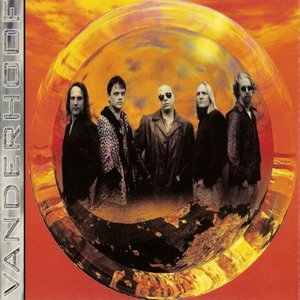Published on Dec 21, 2000
Kurdt Vanderhoof is probably best known for his guitar work with
Metal Church. But Vanderhoof’s love of rock guitar extends far past
the limitations of heavy metal, as he first proved with Hall Aflame
(a band whom I still miss terribly).
Vanderhoof seems to want to show how he was influenced by
progressive space-rock with his new group Vanderhoof, as their
debut album shows. Often, I had to stop to make sure I hadn’t put
Uriah Heep in the player. And, like the aforementioned band,
Vanerhoof runs the gamut from solid efforts to songs that miss the
mark.
Bringing along Metal Church bandmate Kirk Arrington for the
ride, Vanderhoof often lets his bandmates steal his own thunder,
which turns out to be a wise move for the axemaster. Oh, don’t
worry; Vanderhoof has plenty of room to shine on this disc. But
it’s refreshing to hear that he doesn’t turn it into an ego
project; rather,
Vanderhoof is a band effort, pure and simple.
Listen to Brian Cokeley’s organ work throughout
Vanderhoof and tell me that this band wasn’t heavily
influenced by Uriah Heep from the
Demons And Wizards era. Tracks like “Take To The Sky” and
“Angel Now” are solid evidence of this influence, and sometimes
even out-Heeps the Heepsters.
Yet Vanderhoof shows the influence that all good ’70s rock had
on him. “50 Cent Symphony” has hints of Styx in the arrangements,
while “Beg,” “Bleed” and “Machine” all have a feeling of several
bands wrapped up into one unique sound. The way that Vanderhoof
pulls all of his musical influences together into his own sound is
admirable. Each listener may take away their own feelings of
influence on some songs; one person might hear a strong Deep Purple
influence (hmm… we’ll come back to that in a minute) while others
may hear a bit of Genesis or Led Zeppelin in the mix. In this case,
to each their own.
The problem with
Vanderhoof is that the musical gears feel like they’re
constantly changing, and it becomes mentally exhausting trying to
keep up with which direction the band is trying to go in on each
song. Personally, I liked the Uriah Heep-style of the band, and I
could easily see them following that musical path in the future.
Who knows? They might even re-awaken interest in such groups.
The American release of
Vanderhoof includes a cover of Deep Purple’s “Burn,” which
is followed pretty much to the blueprint. It’s kind of fun to hear
it, since this has always been a favorite Purple track of mine, and
Vanderhoof do it justice.
Vanderhoof sometimes sounds like the bandmates are still
getting in touch with each other’s influences, and seeing how they
all shape the final musical product. Once that’s all sorted out,
Vanderhoof should again rise to a higher tier of guitar legend. For
now, this disc is enjoyable, but it’s a bit disjointed.
